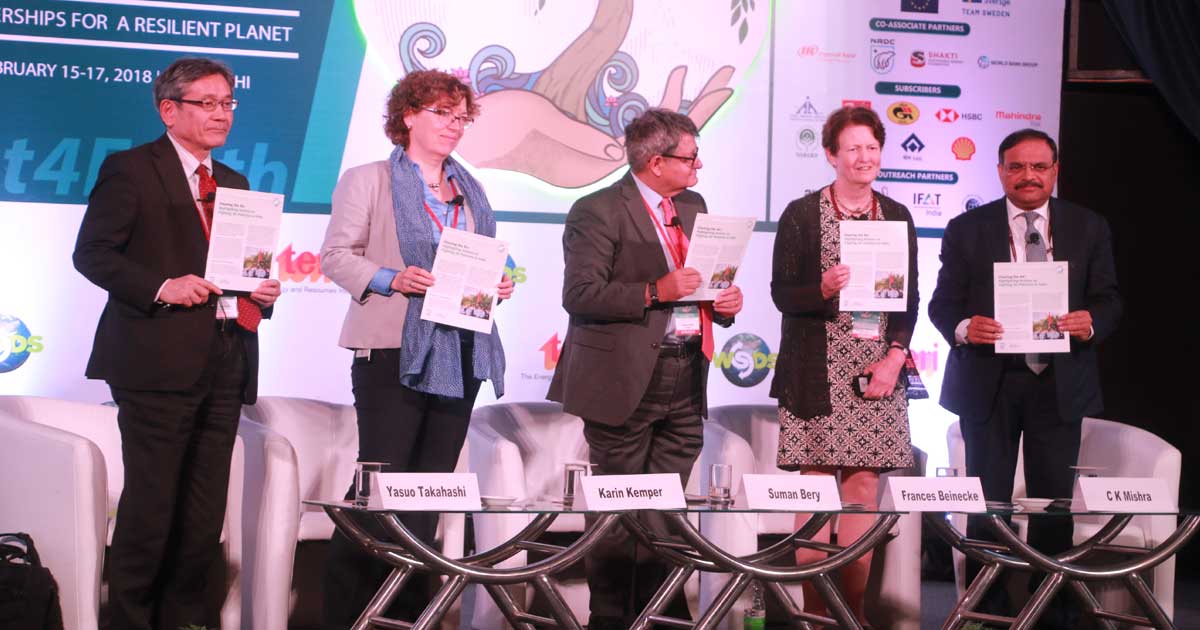
Every Breath You Take
 Breathing Clean Air: Panelists at the WSDS launch the air pollution factsheet by NRDC India
Breathing Clean Air: Panelists at the WSDS launch the air pollution factsheet by NRDC India
Clean air is a fundamental human right. However, air pollution, which has become a global concern, bars many from exercising this right. Experts convened today at the ongoing World Sustainable Development Summit 2018 to deliberate upon the institutional frameworks required for breathing clean air.
The opening session of the concluding day of the summit was chaired by Mr Suman Bery, Former Chief Economist—Strategy & Business Environment, Shell International Ltd, and covered international best practices to curb air pollution and India's ongoing efforts in the field. The panel included Ms Frances Beinecke, Trustee NRDC Action Fund and McCluskey Fellow at Yale School of Forestry & Environmental Studies; Ms Karin Kemper, Senior Director, Environment and Natural Resources Global Practice, World Bank; Mr Yasuo Takahashi, Vice Minister, Global Environmental Affairs, Ministry of Environment, Government of Japan; and Mr C K Mishra, Secretary, Ministry of Environment, Forest and Climate Change (MoEFCC), Government of India. Underscoring that India was in its early stage of industrialization, Mr Bery asked the panel if it was reasonable to expect air pollution will get better quickly in the country.
Mr C K Mishra, Secretary, MoEFCC, said the air quality is not a one-time affair. Long-term sustained efforts and mechanisms are needed for good air quality. He said there were huge developmental imperatives in India that cannot be ignored. India still has to ensure that the fruits of development reach the many underserved people and, therefore, development will be an additional charge on the environment. However, India's growth story, since the last few years, is being rewritten with an underlying faith in sustainability. He added that close to 300 million Indians do not have access to electricity and the government is working towards enhancing the energy access. Highlighting that India plans to add 175 GW of renewable energy capacity, he said that with political will, commitment, and resources to back them, it is possible to make the fruits of development reach the people while still ensuring a clean environment.
Many cities, globally, are grappling with air pollution and each city has to find its unique process to address this problem, said Mr Mishra. While it is the right of the citizens to breathe clean air, Mr Mishra said it should not be the government's concern alone to work on air pollution. It is incumbent upon every segment of the society to come together and play a role. However, the major and prime responsibility lies with the government, he said.
Air pollution control is a multisectoral issue with many players and actors, said Mr Mishra. India needs a convenient platform to bring all stakeholders together at one place to move ahead. While global learnings were extremely important in developing an institutional framework to curb air pollution, local application of those global solutions needs to be designed based on the specific issues and geographies. For instance, vis-à-vis the Indian environmental condition, dust will find a prominent place while in the Western countries, industrial emissions will be prominent. We need to tailor our programmes according to our environment and local understanding, he said.
Mr Yasuo Takahashi, Vice Minister, Global Environmental Affairs, Ministry of the Environment, Government of Japan, shared the learnings from his home country's air pollution control measures. He cited the example of air pollution (primarily due to industrialization) in Japan in the 1950 and 1960s. The country implemented the Air Pollution Act in 1968, whereby the national government established regulations and standards while the local governments enforced them. Today, citizens of Japan enjoy clean air. He said Japan is promoting international cooperation to reduce transboundary air pollution.
Joining the session via video, Mr Rodolfo Lacy, Undersecretary for Planning and Environmental Policy at Mexico’s Ministry of Environment and Natural Resources, shared the best practices that helped Mexico City curb air pollution. These included curbs on heavy industry, private cars, and impetus to the initiatives for greening the city.
Ms Frances Beinecke, Trustee NRDC Action Fund; NRDC Immediate Past President, McCluskey Fellow at Yale School of Forestry& Environmental Studies, released the air pollution factsheet by NRDC India covering Delhi, Bengaluru, Chennai, and Hyderabad. According to her, air pollution has a significant effect on human health; it is a global issue and has significant impacts on the economy and health. She said air monitoring and research is the first and foremost step to improve air quality. Also, civil society plays a critical role in demanding regulations for air pollution control. She cited the example of China where citizens demanded better standards of air quality. She highlighted that India can leverage the latest technology from around the world to curb air pollution.
Ms Karin Kemper, Senior Director, Environment and Natural Resources Global Practice, World Bank, spoke about experiences in various countries with regard to air pollution. She said that 92% of the global population in 2015 breathed air which did not match WHO standards. Air pollution costs $179 billion dollars in man and woman productivity. In the context of South Asia, 1% of the GDP gets impacted due to air pollution. She cited the example of Mexico, Peru, and Mongolia which have taken significant steps to improve air quality.
She suggested creating stronger capacity at different levels of government and institutional set-ups, strengthening enforcement of regulation while creating incentives for industry and citizens to promote wide adoption. As per her, capacity building at all levels and leveraging technology will also support efforts to curb air pollution.